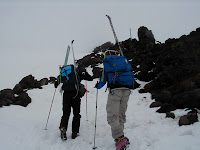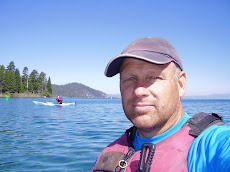January 2008
In January I took my team from work snowshoeing into the Whispering Pines Yurt. For everyone this was the first time snowshoeing and staying at a yurt. The yurt are rented from the Idaho State Parks and come equipted with everything you need. The only thing you need to bring is food and a sleeping bag. We spent the day hiking around the mountain and spent the night eating and playing games.
The Whispering Pines yurt is located off the groomed Gold Fork Loop trail in the Payette National forest. This is a popular loop used by Nordic skiers and snowshoers. The yurt provides easy access to over 27 miles of groomed and 50 miles of marked ski trails. The yurt is located in a high shaded glen. The view from the yurt is one of pine tree covered ridges. The outhouse has a great view of Pilot Peak.









































